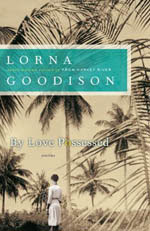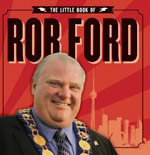
By Love Possessed
hardcover $28.99, trade paperback $19.99, e-book $25.50

The Little Book of Rob Ford
paperback $8.99
February 2011
Ordinary, fascinating people
I don’t know why short stories are not more popular. Canadians have produced some of the world’s best and we revere our great writers of the short form. But novels dominate the bestseller lists.
Yet short stories would seem to offer so much to today’s readers. For one thing, they’re short — you can squeeze in complete works on transit rides or while taking your coffee. And you don’t have to remember a lot of complicated narrative detail from one reading to the next.
If the writer is really fine, like Lorna Goodison, any time you pick up a book, such as her latest collection, you can very, very quickly become immersed in diverse characters and their stories.
Reading the stories in By Love Possessed is that kind of serially immersive experience, though never dense or suffocating. Goodison has the knack of casually bringing us into a new life in each story—perhaps leading with a colloquial remark or a comical turn—and within a couple of pages have us intensely interested in that life.
Though Goodison is currently a part-time Torontonian (splitting her residence with British Columbia and Michigan where she teaches), the lives in her stories are Jamaican, based presumably on her own origins.
One is tempted to say they are colourful lives, but they aren’t really. Rather ordinary folks, mostly poor, who are made fascinating in the telling of their stories. The Pushcart Prize-winning title story starts with a woman, who had once resigned herself to becoming "an old maid,” revelling in her good luck to have landed a younger man, the best-looking one in town too. She supports him, waits on him, and in just over eight pages the expected result comes about—and is put behind her. Oddly, we also got inside the rascal’s head in the process.
In the stand-out story for me, "Jamaica Hope,” a woman tries to get the man for whom she’s borne children to marry her. It’s a happy story for the most part as they do love and support each other, and nothing traumatic happens between them in the course of the story, apart from the death of his bachelor brother. And the story ends with a smile.
That’s common here. I’m grateful Goodison hasn’t adopted the post-modern trick of writing non-linear narratives that leave you hanging in mid-air. Her stories do all end in the middle of an ongoing life, as they should, but on the ground, leaving you with a sigh or a tear or an ah-ha. A completed thought or feeling.
And they’re not all about adult intimate relationships, as the book’s title, taken from a movie a character fantasizes about, might imply. In another memorable story, a young girl boards with a family in another city to go to school but is mistreated by the family because her free-spirit mother’s payments are late. Again it sounds like a simple story and is told simply, but a surprising wealth of character is revealed.
Dialogue throughout the stories is often in what one character derisively calls broken English, a charming patois of dropped, repeated and mashed-up words, though Goodison’s authorial voice is standard English. Much as if one were in Jamaica itself, one gets used to the speech rhythms and starts looking forward to them.
The collection is capped by "I Come Through” that maybe explains Goodison’s own attitude to her art, as a middle-aged popular songstress tells an interviewer about her hard climb to the top and how—taking a lesson from reggae star Bob Marley — she withdraws from the spotlight to eventually re-emerge with a new philosophy of giving with her art.
For a Toronto-raised reader, there is a strangeness involved with getting so quickly into unfamiliar milieus, but not for long. The characters’ basic human concerns and emotional are so universal.
Only short stories could unite us with so many common but great souls. And only a great short story writer could pull this off so seemingly effortlessly.
The Little Redneck Book
Reviewer’s dream: A book one can finish reading in ten minutes. Reviewer’s nightmare: A book one can think of nothing to say about.
Okay, just the facts. The Little Book of Rob Ford is a hundred and forty pages of quotes from Rob Ford, mostly one or two sentences per page, plus ten comments about Rob Ford from critics and fans.
Half-clever idea. Not quite Mao’s Little Red Book. Mainly a collection of redneck quotes from our mayor about stopping the gravy train, hating street cars and praising Orientals (his term). A sprinkling of red-faced statements too, such as when he was caught with a marijuana joint or busted for drunk driving. Nothing you haven’t heard already if you live in Toronto.
Only interesting statement I found was his claim that he’s a social liberal. But it’s only a sentence with no explanation, so I’m puzzled what he means by that. Unless it’s the drinking and apparent dope smoking.
Okay for a laugh. Would have been a good joke stocking-stuffer for anti-Fordites if it had come out a couple of months earlier.
Tellingly, no one wants to take credit for inflicting this book on the Toronto public. The author listed on the title page is “The Unknown Torontonian”.
— Eric McMillan

